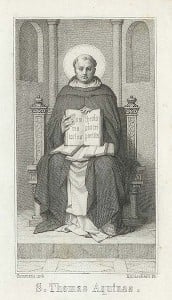 We’re blogging through St. Thomas Aquinas’ Compendium Theologiae, sometimes called his Shorter Summa. Find the previous posts here.
We’re blogging through St. Thomas Aquinas’ Compendium Theologiae, sometimes called his Shorter Summa. Find the previous posts here.
Today’s post is from Chapter 69: “Creation from Nothing”
In the previous chapter, Thomas shows that God is the source of existence in all things that are other than Himself. When we humans "create", we are making something new out of existing materials; but when God creates, He creates ex nihilo, from nothing.
This makes it clear that, in creating, God has no need of pre-existing matter from which to fashion things.
There's a joke about that; a scientist claims to be able to create life, and God challenges him to do so. The scientist begins, "OK, so I take this dirt, and…" and God interrupts him. "No, no," says God. "Create your own dirt." Thomas continues,
No agent needs, prior to his action, what he produces by his action; he needs only what he is unable to produce by his action. The builder requires stones and lumber before he can set to work, because he is unable to produce these materials by his action. On the other hand, he does not presuppose a house, but produces it by his activity.
To make a peanut butter sandwich I need (at a minimum) bread and peanut butter, neither of which I produce myself. But if someone hands me a peanut butter sandwich, I can't exactly say that I made it.
But matter must be produced by God’s action since, as has just been proved, everything that exists in any way at all has God as the cause of its existence. Therefore the conclusion follows that God does not presuppose matter in His activity.
Given that matter is something that has existence, and matter is not God, this follows naturally: God must create all matter. In Thomas' terms, God is the principle of matter, that is, the ultimate cause or source of matter. (To Thomas, as to Aristotle, philosophy is the search for the principles of things.)
Besides, act naturally precedes potency, and hence the notion of principle primarily befits act.
A thing is what it is; that is its act. It is in potency with respect to the things it can be. The sandwich is a sandwich; it could turn blue (by being painted, or getting moldy), and it could turn into energy for my body (by being eaten). To the extent that the sandwich is the principle cause of anything, it has to be because of what it is, not because of what it could be; that's what Thomas means by saying "the notion of principle primarily befits act."
But there are principles and then there are principles.
But any principle that in creating would presuppose some other principle, would verify the concept of principle only in a secondary way.
Peanut butter might be a principle of nourishment, but peanut butter has a principle of its own: peanuts, and beyond that fat, protein, and calories. It isn't an ultimate principle.
Accordingly, since God is the principle of things as the first act, whereas matter is a principle as a being in potency, it is unthinkable that matter should be presupposed before God can act.
God is the ultimate principle of created things; whereas matter, in Thomas' terms, is that which has the potential to take on new forms. Simply put, matter is that which can be changed; it presupposes something to change, which is to say it presupposes existence.
Next Thomas goes on to give a second argument, involving universal and particular causes. I'm not entirely sure I grasp it, but I'll take a stab at it.
Furthermore, the more universal a cause is, the more universal its effect is. Particular causes make use of the effects of universal causes for something determinate; and such determination is related to a universal effect as act to potency.
In Thomas' terms, a universal is a kind of thing; when you think of peanut butter, that concept of peanut butter in your mind is a universal. When you think of this peanut butter, in the sandwich on your plate, that's a particular.
Thus, peanut butter when eaten nourishes the body, giving energy for living; that's universal cause and a a universal effect (peanut allergies not withstanding). This particular peanut butter, in my sandwich, gives energy to my particular body. That's a particular effect.
More concisely, peanut butter is nourishing, that is, it has the potential of nourishing (universal); and if I eat a peanut butter sandwich (particular) I am actualizing that potential. And this is a normal pattern:
Hence any cause that causes something to be in act, utilizing pre-existing material that is in potency to that act, is a particular cause with respect to some more universal cause.
But God cannot be this kind of particular cause, because there isn't any more universal cause. God must create from nothing; and so we call Him the Creator:
But this sort of procedure cannot pertain to God, since He is the first cause, as we showed above. Consequently God does not need matter as a prerequisite to His action. Therefore He has the power to bring things into existence from nothing or, in other words, to create. This is why the Catholic faith professes that He is the Creator.
____
photo credit: Public Domain; source Wikimedia Commons






